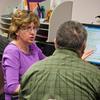
Photo by On Being
Over the last three years, I have tried to read broadly about the challenges and opportunities of aging. Now that I've consumed over 50 books on the topic, I'm seeing a few trends. For example, several long-established, best-selling authors are now writing books about caregiving. They are doing so because they have become caregivers themselves.Diane Ackerman writes about supporting her husband after his stroke in her 2001 book One Hundred Names for Love: A Stroke, a Marriage and the Language of Healing. Review
Jane Gross describes how she advocates for her mother over several years and several levels of health, showing how caregiving is an ever-evolving activity in her 2011 book A Bittersweet Season: Caring for Our Aging Parents--and Ourselves. Review
Betty Rollin explains her perspective as an adult child trying to help her mother manage a devastating cancer diagnosis and invasive treatment in her 1998 book The Last Wish. Review.
Gail Sheehy once again helps her age mates map out the landscape of a life stage--based on her experience providing care for her husband as well as journalistic-style interviews and research--but this time the path is more recursive than linear in her 2010 book Passages in Caregiving: Turning Chaos into Confidence. Review
Paula Span found that supporting her aging parent trickier than she anticipated, so she dove into the topic and followed other pairs of adult children and their parents through their challenges and produced this 2010 book When The Time Comes: Families with Aging Parents Share Their Struggles and Solutions. Review
Many of these women have served for the past three or four decades as "The Voice of a Generation," but here they are showing vulnerabilities, loss, confusion and a little bit of terror as they face the task of supporting family members with day-to-day needs. Gone is the glamour as they talk about bodily functions, financial hardships and painful shifts in the dynamics of their family relationships.
True, many of them have immense resources for addressing caregiving: research skills, contacts, and above-average income. However, even these women with greater resources than the average caregiver reveal how the task can bankrupt them financially, emotionally, spiritually. By drawing on deep reservoirs of personal character, each of these women finds strength--although sometimes fleeting. And they find wisdom, which they share in the pages of their books. But more than that, they offer compassion to all those walking the difficult-yet-oft-rewarding path of caring for a loved one during a time of great need.
For more discussion on the topic of caregiving, please view the video below of Jane Gross speaking at the Hastings Center. She starts her 30 minute presentation at 7:55 (with an introduction prior and discussion from the audience following).
Related:
Books on Aging
Films Featuring Older Adults

